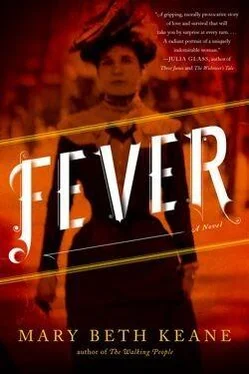Then, very early one Tuesday morning, she heard her name being called.
“Mary!” a woman’s voice chased her from across the street. “Mary Mallon!”
She turned and saw Joan Graves hold out her hand to stop traffic as she rushed across the street to Mary’s side.
“I can’t believe it!” Joan said, and threw her arms around Mary.
“Joan,” Mary said simply, and let herself be hugged. She was happy to see Joan, silly Joan, talented Joan, who could sew more surely than anyone Mary had ever known.
“I heard there was a hearing, but I thought they’d taken you back to the island.”
“Oh, you heard all about it, I’m sure.”
“Well, it was in the papers. We followed it, Fran and I did. But you’re here. And look at you! I thought you were sick. Have you been sick? What are you doing now? Where are you living? Why didn’t you come see us right away?”
“I was planning to, but—”
“And what about Alfred, have you seen him? He told Fran’s Robert that he did the Oppenheimer cure.”
Mary didn’t remember Joan being so aggressive. She didn’t remember her as a piler of questions, and she was absolutely certain that the old Joan would never have brought up the cure, which was a roundabout way of bringing up the problem, and the drink, and the late nights, and Mr. Hallenan’s shouts up the stairs. The Joan Mary knew might have brought it up privately, with such subtlety that Mary wouldn’t know what she was talking about right away. Not out on the street. Not first thing after seeing her after so long.
“Where did you see Alfred?” She might as well ask rather than be distracted by wondering all day long.
“In the building. He does odd jobs for Mr. Driscoll now and again after he finishes up at the stable. You haven’t seen him?”
“No.”
“I’m sorry, Mary. I heard about… his new place. I don’t know why I asked that.”
Mary wanted to ask several questions at once: Did he seem happy? What did they talk about? But she didn’t ask anything. No, she was not interested. She would not beg for information. She would not ask for Joan’s husband, and all of their neighbors, just so at the end of that long list she could ask discreetly about Alfred. She wouldn’t do it.
“I’m late, Joan. It was great seeing you.”
“But you haven’t seen me! Mary, you must come by! Will you come for supper one night? On Sunday? When were you released?”
Mary was already sidestepping toward the laundry, which she could see was open and accepting customers. Let them fire her, she thought. Let them try. She’d march straight up to Lederle’s office and ask him for the money from his wallet. She’d wait in the street outside Soper’s office and mug him as he made his way home.
“I’m not sure I can, Joan. I’ll let you know.”
“Yes, let me know. If not this Sunday, then next Sunday.”
“I’ll let you know.” Mary had turned now, was walking away.
“Oh, and Mary!” Joan called after her. “Mary! I almost forgot!” Mary steeled herself. She’d met Alfred’s Liza. She’d met precious Samuel. Mary wanted to take her scarf and stuff it in Joan’s mouth.
“We have a baby girl now. She’s eleven months. You have to see her. She’s the sweetest thing, and—”
Mary stopped. “You had a baby? You’re kidding me.”
“I’m not kidding,” Joan laughed. “You were right. Sometimes it does take a long time. Will you come by, Mary? To meet her?”
“I can’t believe it.” Mary looked around as if the baby might be hiding in an alley, peeking out at them.
Joan laughed. “Fran is minding her. She lets me get out by myself for an hour.”
It was Mary’s turn to laugh. “Fran! I thought she said she was done with babies once she got her last one in school. She once told me she’d push Robert straight out the window if he said he wanted to have another.”
“You know Fran. She was the first one cooing into the bassinet when she was born.”
“What’s her name?”
“Dorothy Alice.” Even saying the child’s name, Mary saw, cast a glow of joy on Joan’s face. All the impatience Mary felt just a few minutes previous was gone, and now she hugged her friend, told her that she was happy for her. Joan would be a good mother, and if the child had half the heart Joan had she’d be a kind person. For the first time since leaving North Brother, Mary forgot why she hadn’t seen her friends in so long, and wanted to go straight over to the old building to tease Fran. Joan would make a pot of coffee and the three of them would gab away the morning. Who cared about Alfred? Not her. If she passed him in the hall she wouldn’t even turn to look at him.
As the moment began to pass, Joan frowned. “And you’re not sick, right, Mary? You don’t look sick. What they said about you and those people you cooked for? It’s not true, is it? That’s why they let you out?”
Mary sighed. “They only ever said it was the people I cooked for who got sick.”
“And that wasn’t true?”
“Well, a few got sick. A handful really, out of how many I’ve cooked for. But it was a coincidence. It was a — well, it wasn’t fair anyway. There’s a dairyman upstate—”
“I knew it. I said to myself, our Mary has no disease, the way you used to work so hard and run up and down those stairs. So you’ll come and meet the baby, won’t you?”
And as Mary heard herself promise that she would, she knew it was true. She wanted to see Joan’s baby. She wanted to see Fran. Even Patricia Tiernan would be a familiar face, and what had she craved those three years on North Brother but a familiar face? What had she wanted most but to talk to someone who knew things about her that had nothing to do with Soper or Typhoid or even cooking. And they were her friends. They would understand that she didn’t want to talk about Alfred, that there was nothing to say. Never in all the years they’d known one another did either Joan or Fran say a word about their not being married, only concerns about his health, and how hard she worked, and if, perhaps, she didn’t sometimes wish she had a man who took care of her and not the other way around. But there hadn’t been judgment, not really. And she had to hope there would be no judgment now, either, after the humiliation of his leaving her, marrying someone else.
She worked. After two months at the laundry Li told her that they’d been worried about taking her on as a favor, but that she was as fine a worker as any Chinese, as any person Li had ever known. He told her that Chu was also very pleased. The Lithuanian women acknowledged her more often, nodding and giving her brief smiles before turning back to their stew of cottons and wools.
In the window of the corner grocer she found an ad for a woman boarder. The building was on Thirty-First Street and Second Avenue, and she decided not to care that it was so close to the old building, but when she went over there she saw that it was little better than Mrs. Post’s. There were cots everywhere, and a pair of exhausted-looking women sitting at a table without talking to each other while she got the ten-second tour and a rundown of the rules. There had to be something better, but it was impossible to really look, with only half a day off every week, and the long hours of the weekdays. She pursued another ad she’d seen in the newspaper, but when she got there nothing seemed right — the large living area, the high ceilings, the separate kitchen, the man who emerged quietly from one of the three bedrooms and held a hushed discussion in the corner with the widow who’d answered the door at Mary’s knock. The man skulked by Mary and ran down the stairs of the building without saying good-bye or good day to anyone, not even the women lounging on the silk sofa like cats stretched out in the sun. Mary realized where she was just as the young widow came over to her and asked her to take down her hair, reaching, as she said it, for Mary’s pins. Mary held tight to the banister as she made her way back down to the street.
Читать дальше












